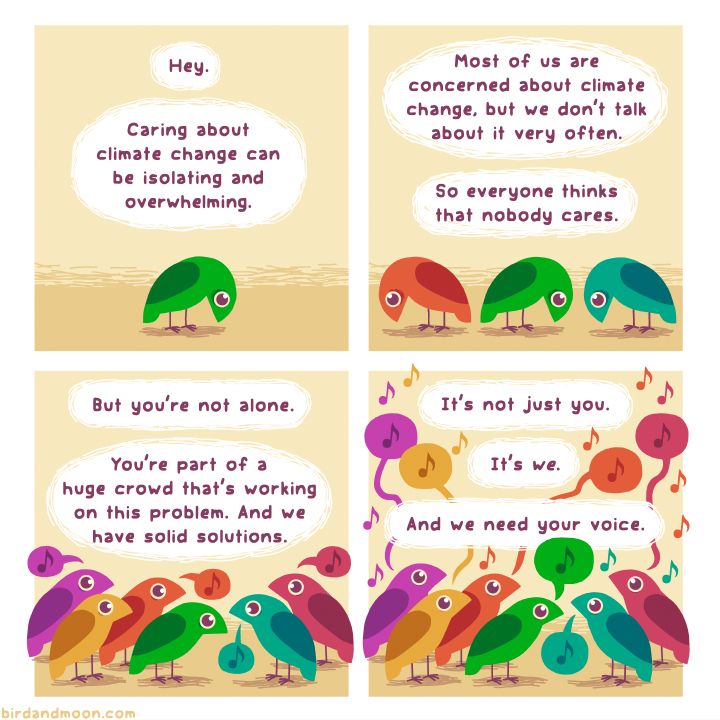Rosemary Mosco: Climate Illustration

A comic that circulated through social media this past month spread hope on climate change to thousands, and it was all inspired by the artist’s connections to the National Network for Ocean & Climate Change Interpretation (NNOCCI). “Climate Worries”, a cartoon by science writer and naturalist Rosemary Mosco, addresses the emotional weight of climate change in an approachable format. The story also shares remedies, like civic responsibility, collective action and a community of support, that have long been NNOCCI cornerstones.

Since it was originally posted to social media and the artist’s blog on February 6th, the comic has collected 1,900 likes on Twitter and Facebook, was retweeted 974 times and has been shared 1,319 times. In the comments section, it struck up positive, productive conversations among viewers across all platforms.
For Rosemary, whose previous work has covered topics like space science and ornithology, climate change has always been a key issue. She’s well known in science communication circles for her signature style of accessible, relatable writing and colorful, witty science illustrations. In applying her talents to climate action, she sought the advice of NNOCCI Network Manager Hannah Pickard. Climate Interpreter caught up with Mosco shortly after the release of “Climate Worries” to discuss her motivations and process, the importance of visual communications and the public response to her work.
Hey, Rosemary, thanks for making the time to talk with us! First off, we have to ask, what was your inspiration for creating this wonderful comic?
“I spend a lot of time worrying about climate change, thinking about solutions and volunteering, but I don’t hear a lot of people talking about it, so I feel isolated, and I find myself questioning my own knowledge. And it turns out, I’m not alone! [Social science research] work by Yale and others has shown that most of us care, but few of us are talking about it. We need to break the silence.”
How did you end up getting connected with the National Network for Ocean & Climate Change Interpretation on this project, and how did that influence your work?
“I’ve been a fan of NNOCCI’s workshops and [resources] for a long time. I had a chat with [NNOCCI Network Manager] Hannah Pickard about comic ideas, and she echoed a lot of my feelings. She suggested that I turn my concerns into a cartoon and told me that it could help cheer up people who are working hard on this issue. Climate scientists and communicators are my heroes, so the idea of giving them comfort was appealing. Hannah looked at early drafts and helped tweak the language, and she was a great cheerleader!”
What were your hopes or fears with releasing this work, and how has the reception been so far?
“I guess I had two fears. First, I was worried that I’d get attacked by trolls. The climate scientists I follow, especially women, get trolled viciously and almost constantly. A lot of the accounts are bots or puppets, but that doesn’t make their words any less hurtful. Luckily, I didn’t get too many of those, just a few people who wanted to tell me that they’re looking forward to climate change coming to their northern countries! I’m from Canada, and I’ve watched the ice rinks disappear and the forests burn, so yeah, I’m not buying that! I was also worried that people wouldn’t relate to my comic; that I really was alone in my feelings, or that I’d misjudged what people need. But the response has been very positive. People tell me that they needed to hear this. They say it’s making them feel more empowered. I’m getting a flood of nice messages, and it’s wonderful! There really are a lot of us working on this issue. We all need to remember this in our darkest times.”
So how did you originally get into science illustration, and what drew you to the topic of climate change?
“I’m not a science illustrator so much as a cartoonist and communicator. I do more writing than drawing. I love how comics can clarify issues and add humor that helps spread messages far and wide. Climate change is a natural topic for me. Once you start learning about any social or environmental issue, it’s tied to climate change somehow. There’s no avoiding it. It has links to poverty, conservation, health, politics, the economy, everything. It’s the big issue of our time.”
What role do you think creative visual communications can play in helping to advance action on environmental issues?
“People learn in different ways, so it’s good to spread messages using different formats. Comics are great because they’re easily passed around on social media. Diagrams and visuals have always been a huge part of science, and art and science are natural friends. It just makes sense to turn research into visuals.”
Any other thoughts you’d like to share with climate communicators?
“You are not alone! You’re part of a huge network of people who are working on these issues. Get outside, join a group, and meet people. Use hope to propel you forward. If you have to take breaks, take breaks. Spend time in nature and reconnect with the world. We need you, and we need you at the top of your game.”
To learn more about Rosemary’s work, visit http://rosemarymosco.com/
More Blog Posts
 The Right Message from the Right MessengerThe Right Message from the Right Messenger Allison Arteaga, December 20 2017 The National Network for Ocean & Climate Change Interpretation (NNOCCI) has some exciting news for climate change communicators! Those of you who have received training in Strategic Framing® techniques through the network may recall collecting pre- and post- training [READ MORE]
The Right Message from the Right MessengerThe Right Message from the Right Messenger Allison Arteaga, December 20 2017 The National Network for Ocean & Climate Change Interpretation (NNOCCI) has some exciting news for climate change communicators! Those of you who have received training in Strategic Framing® techniques through the network may recall collecting pre- and post- training [READ MORE] IPCC Communications Tips for ScientistsIPCC Communications Tips for Scientists Allison Arteaga, February 07 2018 In late January, ahead of the anticipated release of a new IPCC report later this year, the Intergovernmental Panel on Climate Change (IPCC) released a new handbook for their scientific authors on how to more effectively engage the public and communicate about climate change [READ MORE]
IPCC Communications Tips for ScientistsIPCC Communications Tips for Scientists Allison Arteaga, February 07 2018 In late January, ahead of the anticipated release of a new IPCC report later this year, the Intergovernmental Panel on Climate Change (IPCC) released a new handbook for their scientific authors on how to more effectively engage the public and communicate about climate change [READ MORE] IMPORTANT UPDATE: Federal Funding for NNOCCI TerminatedWe wanted to alert you of a significant event that is impacting our team and work. We received notice earlier this month that our active 2-year grant through the US Embassy in Canada (a part of the US State Department) has been terminated effective immediately. While the details provided by the State Department are extremely minimal, it is almost certainly connected with the recent decisions by the new administration to cut funding for all international partnerships and eliminate funding aimed at climate. [READ MORE]
IMPORTANT UPDATE: Federal Funding for NNOCCI TerminatedWe wanted to alert you of a significant event that is impacting our team and work. We received notice earlier this month that our active 2-year grant through the US Embassy in Canada (a part of the US State Department) has been terminated effective immediately. While the details provided by the State Department are extremely minimal, it is almost certainly connected with the recent decisions by the new administration to cut funding for all international partnerships and eliminate funding aimed at climate. [READ MORE] Museums Mobilizing Climate ActionMuseums Mobilizing Climate Action Billy Spitzer, August 06 2018 (Excerpted from a commencement speech for the Harvard Extention School Museum Studies Program) The Role of Museums In Tackling Climate Change At the New England Aquarium, I spend most of my time working at the intersection of museums and sustainability. About 10 years ago, we realized [READ MORE]
Museums Mobilizing Climate ActionMuseums Mobilizing Climate Action Billy Spitzer, August 06 2018 (Excerpted from a commencement speech for the Harvard Extention School Museum Studies Program) The Role of Museums In Tackling Climate Change At the New England Aquarium, I spend most of my time working at the intersection of museums and sustainability. About 10 years ago, we realized [READ MORE] My Community is My Hope #100HopefulDaysMy Community is My Hope #100HopefulDays Sarah-Mae Nelson, MS, CIG/CIT, February 03 2017 Today I turn 37 years old. This seems like an impossible number. In my mind, I am a vibrant 21-year-old eager to make the world a better place. I see opportunities to make a positive difference everywhere. I am young, I am empowered, and I am unstoppable. In [READ MORE]
My Community is My Hope #100HopefulDaysMy Community is My Hope #100HopefulDays Sarah-Mae Nelson, MS, CIG/CIT, February 03 2017 Today I turn 37 years old. This seems like an impossible number. In my mind, I am a vibrant 21-year-old eager to make the world a better place. I see opportunities to make a positive difference everywhere. I am young, I am empowered, and I am unstoppable. In [READ MORE]